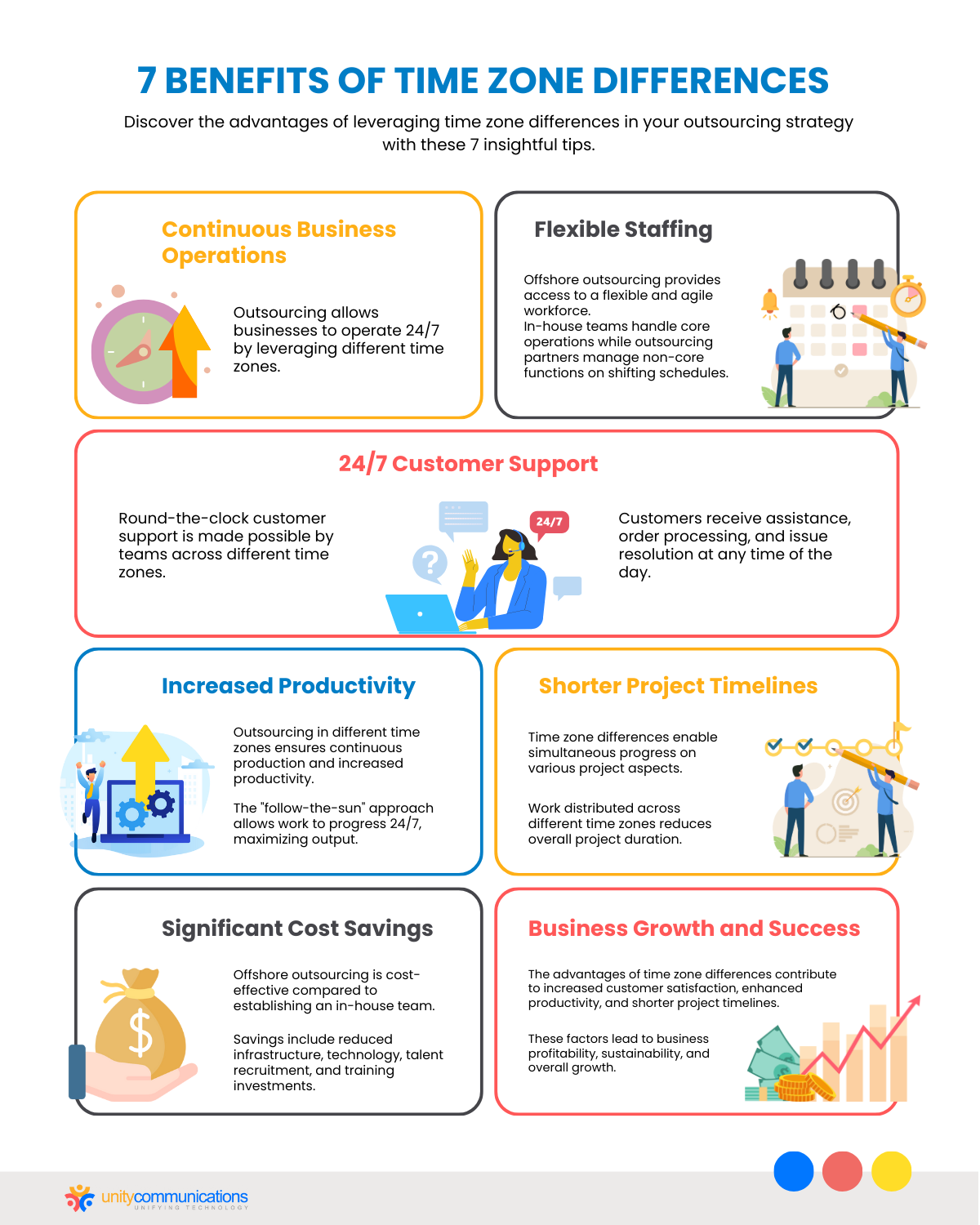Table of Contents
Globalization paved the way for the rise of offshore outsourcing. Today, many companies employ business process outsourcing (BPO) by hiring service providers on the other side of the globe. The provider and the client operate in different time zones, often with six- to 12-hour differences.
But do time zones pose challenges in BPO? For all you know, there are some advantages to time zone differences in outsourcing. Read on to discover the key benefits and learn some practical tips below.
Seven Key Benefits of Time Zone Differences in Outsourcing

Let us begin by asking: What is BPO? BPO entails contracting functions to a third-party service provider. Businesses delegate their tasks to external vendors, usually located in different countries. As a result of this physical distance, time zone differences are one of the main features of outsourcing.
Nearshore and onshore outsourcing usually have similar time zones with negligible differences. The gap is much more apparent in offshore BPO. An American financial institution can outsource customer service to the Philippines and information technology (IT) support to India. In either situation, you can expect a 10-hour time difference or more.
Unfortunately, there is less emphasis on the advantages of time zone differences in outsourcing. Some companies even think such differences can harm their business operations. Below are a few ways time gaps offer practical benefits.
1. Continuous Business Operations
Business hours are usually from 8 a.m. to 5 p.m. However, in today’s landscape, some organizations must stay up and running 24/7. For instance, IT support requires undisrupted operations. That is where outsourcing comes in.
Continuous operations are one of the BPO advantages of time zone differences. That is true whether you’re using inbound or outbound BPO. You can hire an overseas BPO partner to handle some of your business functions during your non-working hours. For example, an offshore provider in India handles remote IT monitoring and troubleshooting.
2. Flexible Staffing
Workers are the most valuable stakeholders in business since they are on the front lines, ensuring day-to-day operations. Companies need a flexible workforce that can work relentlessly and quickly adapt to changes. When it comes to flexibility, offshore outsourcing is the key.
That said, flexible staffing is one of the benefits of time gaps. You can establish an in-house team to handle your core operations. However, you can hire an outsourcing partner with a robust and agile crew. Your BPO workforce can manage non-core functions and work on shifting schedules as needed.
3. 24/7 Customer Support
Today’s customers have higher expectations than ever before, and 93% of service teams agree with this statement. Around 76% of customer service teams now offer support during non-business hours. Therefore, hiring a BPO service provider that works around the clock helps.
Round-the-clock customer support is one of the advantages of time zone differences in outsourcing. With teams across different time zones, you can provide your customers with 24/7 assistance. While one team rests, another will answer customer inquiries, process orders, and resolve issues.
4. Increased Productivity
Every business aspires to be as productive as possible. Productivity is one of the standard metrics that every company hopes to achieve. The more productive they are, the more income they generate for their business.
Increased productivity is among the outsourcing advantages of time zone differences. You can work with a BPO service provider in a different time zone. Your core team finishes their workday and entrusts functions to the third-party team. This “follow-the-sun” approach ensures that production continues 24/7.
5. Shorter Project Timelines
Businesses engage in various projects. They plan to launch new products, offer new services, or expand to new markets. They partner with BPO providers to access expertise and technology when implementing such projects, and time zone differences help speed up the timeline.
You can leverage the overlapping hours by distributing work across teams in different time zones. This strategy paves the way for simultaneous progress on various aspects of your project, reducing the overall duration. Your core and BPO teams can thus complete the project as soon as possible.
6. Significant Cost Savings
Cost reduction is the top reason companies engage in BPO, especially offshore outsourcing. Working with an offshore provider is more cost-effective than establishing an in-house team. The latter requires infrastructure, technology, talent recruitment, and training investments.
Cost savings are one of the advantages of time zone differences in outsourcing. Why would you risk outsourcing to a BPO partner in a far-off location with a six- to 12-hour difference? This strategy suggests that offshore outsourcing can help save money in the long run.
7. Business Growth and Success
Finally, the outsourcing advantages of time zone differences contribute to business growth and success. Increased customer satisfaction, enhanced productivity, and shorter project timelines collectively translate to business profitability and sustainability.
You can scale your operations and seize growth opportunities by harnessing time zone differences. Ultimately, offshore outsourcing can help you achieve overall business success in the long term.
Five Time Zone Considerations for Effective Outsourcing

Businesses employ offshore outsourcing to reduce operating and labor expenditures. Deloitte cites cost reduction as the top outsourcing reason worldwide. However, many organizations neglect the fact that time zone differences in offshore outsourcing offer several other potential benefits.
Companies can no longer ignore the advantages of time zone differences in outsourcing. However, the global nature of outsourcing requires critical planning and careful implementation to ensure seamless collaboration, productivity, and operational efficiency. Otherwise, your organization might encounter communication issues, cultural gaps, and business disruptions.
Considering time zone differences carefully is crucial for a successful BPO engagement. Here are five considerations to make for effective outsourcing:
- Match the Time Zones. This strategy involves selecting a BPO partner whose work hours align with your operational needs. For example, if you plan to establish round-the-clock customer service operations, choose the Philippines as your outsourcing destination and hire a service provider with 24/7 shifts.
- Pick the Right Provider. Hire a BPO partner to help you make the most of the time zone differences. For instance, ensure your hired service provider operates 24/7 with BPO team members working on shifting schedules.
- Align Business Goals. Both parties must clearly understand the operational objectives, service expectations, desired outcomes, and project timelines. Ensure the time zone differences do not stop your BPO provider from achieving these goals.
- Set Communication Protocols. To remove time zone barriers, establish effective communication channels and protocols, and ensure constant collaboration through check-ins and meetings. For example, set BPO call center time zone management for your customer support operation.
- Use Collaboration Tools. Leveraging the latest digital tools and technologies is crucial when working across different time zones. For instance, consider contact center as a service (CCaaS) software for customer interactions and unified communications as a service (UCaaS) technology for employee collaboration.
The Bottom Line

Outsourcing, particularly offshore outsourcing, entails two companies working together in different time zones. This strategy poses challenges such as communication barriers, cultural differences, and business disruptions. But contrary to common notions, there are advantages to time zone differences in outsourcing.
Working across different time zones allows your business to have undisrupted operations, achieve staff flexibility, and offer 24/7 customer support. Those factors can boost productivity, reduce turnaround time, and enhance customer satisfaction.
Looking to take advantage of time zone differences in outsourcing? Let’s connect! Unity Communications offers offshore outsourcing services to businesses of all sizes. No matter where you are, we’ll help streamline your operations and grow your business!




